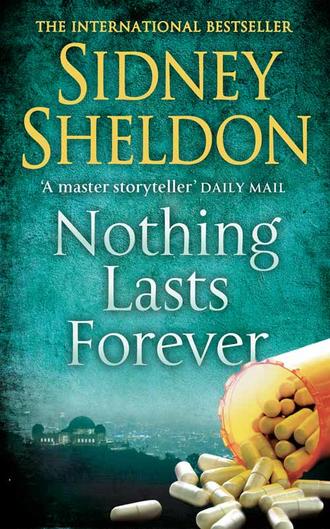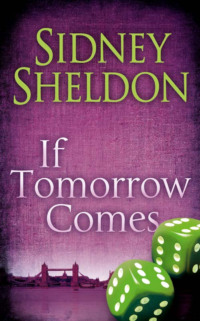
Полная версия
Nothing Lasts Forever
“Overruled.”
“Yes, there was.”
“Please explain what it was.”
“We had a patient who Dr. Taylor decided needed a blood transfusion. His family refused to grant permission.”
“And what happened?”
“Dr. Taylor went ahead and gave the patient the transfusion anyway.”
“Is that legal?”
“Absolutely not. Not without a court order.”
“And then what did Dr. Taylor do?”
“She obtained the court order afterward, and changed the date on it.”
“So she performed an illegal act, and falsified the hospital records to cover it up?”
“That is correct.”
Alan Penn glanced over at Paige, furious. What the hell else has she kept from me? he wondered.
If the spectators were searching for any telltale sign of emotion on Paige Taylor’s face, they were disappointed.
Cold as ice, the foreman of the jury was thinking.
Gus Venable turned to the bench. “Your honor, as you know, one of the witnesses I had hoped to call is Dr. Lawrence Barker. Unfortunately, he is still suffering from the effects of a stroke and is unable to be in this courtroom to testify. Instead I will now question some of the hospital staff who have worked with Dr. Barker.”
Penn stood up. “I object. I don’t see the relevance. Dr. Barker is not here, nor is Dr. Barker on trial here. If …”
Venable interrupted. “Your honor, I assure you that my line of questioning is very relevant to the testimony we have just heard. It also has to do with the defendant’s competency as a doctor.”
Judge Young said skeptically, “We’ll see. This is a courtroom, not a river. I won’t stand for any fishing expeditions. You may call your witnesses.”
“Thank you.”
Gus Venable turned to the bailiff. “I would like to call Dr. Mathew Peterson.”
An elegant-looking man in his sixties approached the witness box. He was sworn in, and when he took his seat, Gus Venable said, “Dr. Peterson, how long have you worked at Embarcadero County Hospital?”
“Eight years.”
“And what is your specialty?”
“I’m a cardiac surgeon.”
“And during the years you’ve been at Embarcadero County Hospital, did you ever have occasion to work with Dr. Lawrence Barker?”
“Oh, yes. Many times.”
“What was your opinion of him?”
“The same as everyone else’s. Aside, possibly, from DeBakey and Cooley, Dr. Barker is the best heart surgeon in the world.”
“Were you present in the operating room on the morning that Dr. Taylor operated on a patient named …” He pretended to consult a slip of paper. “… Lance Kelly?”
The witness’s tone changed. “Yes, I was there.”
“Would you describe what happened that morning?”
Dr. Peterson said reluctantly, “Well, things started to go wrong. We began losing the patient.”
“When you say ‘losing the patient …’ ”
“His heart stopped. We were trying to bring him back, and …”
“Had Dr. Barker been sent for?”
“Yes.”
“And did he come into the operating room while the operation was going on?”
“Toward the end. Yes. But it was too late to do anything. We were unable to revive the patient.”
“And did Dr. Barker say anything to Dr. Taylor at that time?”
“Well, we were all pretty upset, and …”
“I asked you if Dr. Barker said anything to Dr. Taylor.”
“Yes.”
“And what did Dr. Barker say?”
There was a pause, and in the middle of the pause, there was a crack of thunder outside, like the voice of God. A moment later, the storm broke, nailing raindrops to the roof of the courthouse.
“Dr. Barker said, ‘You killed him.’ ”
The spectators were in an uproar. Judge Young slammed her gavel down. “That’s enough! Do you people live in caves? One more outburst like that and you’ll all be standing outside in the rain.”
Gus Venable waited for the noise to die down. In the hushed silence he said, “Are you sure that’s what Dr. Barker said to Dr. Taylor? ‘You killed him’?”
“Yes.”
“And you have testified that Dr. Barker was a man whose medical opinion was valued?”
“Oh, yes.”
“Thank you. That’s all, doctor.” He turned to Alan Penn. “Your witness.”
Penn rose and approached the witness box.
“Dr. Peterson, I’ve never watched an operation, but I imagine there’s enormous tension, especially when it’s something as serious as a heart operation.”
“There’s a great deal of tension.”
“At a time like that, how many people are in the room? Three or four?”
“Oh, no. Always half a dozen or more.”
“Really?”
“Yes. There are usually two surgeons, one assisting, sometimes two anesthesiologists, a scrub nurse, and at least one circulating nurse.”
“I see. Then there must be a lot of noise and excitement going on. People calling out instructions and so on.”
“Yes.”
“And I understand that it’s a common practice for music to be playing during an operation.”
“It is.”
“When Dr. Barker came in and saw that Lance Kelly was dying, that probably added to the confusion.”
“Well, everybody was pretty busy trying to save the patient.”
“Making a lot of noise?”
“There was plenty of noise, yes.”
“And yet, in all that confusion and noise, and over the music, you could hear Dr. Barker say that Dr. Taylor had killed the patient. With all that excitement, you could have been wrong, couldn’t you?”
“No, sir. I could not be wrong.”
“What makes you so sure?”
Dr. Peterson sighed. “Because I was standing right next to Dr. Barker when he said it.”
There was no graceful way out.
“No more questions.”
The case was falling apart, and there was nothing he could do about it. It was about to get worse.
Denise Berry took the witness stand.
“You’re a nurse at Embarcadero County Hospital?”
“Yes.”
“How long have you worked there?”
“Five years.”
“During that time, did you ever hear any conversations between Dr. Taylor and Dr. Barker?”
“Sure. Lots of times.”
“Can you repeat some of them?”
Nurse Berry looked at Dr. Taylor and hesitated. “Well, Dr. Barker could be very sharp …”
“I didn’t ask you that, Nurse Berry. I asked you to tell us some specific things you heard him say to Dr. Taylor.“
There was a long pause. “Well, one time he said she was incompetent, and …”
Gus Venable put on a show of surprise. “You heard Dr. Barker say that Dr. Taylor was incompetent?”
“Yes, sir. But he was always …”
“What other comments did you hear him make about Dr. Taylor?”
The witness was reluctant to speak. “I really can’t remember.”
“Miss Berry, you’re under oath.”
“Well, once I heard him say …” The rest of the sentence was a mumble.
“We can’t hear you. Speak up, please. You heard him say what?”
“He said he … he wouldn’t let Dr. Taylor operate on his dog.”
There was a collective gasp from the courtroom.
“But I’m sure he only meant …”
“I think we can all assume that Dr. Barker meant what he said.”
All eyes were fixed on Paige Taylor.
The prosecutor’s case against Paige seemed overwhelming. Yet Alan Penn had the reputation of being a master magician in the courtroom. Now it was his turn to present the defendant’s case. Could he pull another rabbit out of his hat?
Paige Taylor was on the witness stand, being questioned by Alan Penn. This was the moment everyone had been waiting for.
“John Cronin was a patient of yours, Dr. Taylor?”
“Yes, he was.”
“And what were your feelings toward him?”
“I liked him. He knew how ill he was, but he was very courageous. He had surgery for a cardiac tumor.”
“You performed the heart surgery?”
“Yes.”
“And what did you find during the operation?”
“When we opened up his chest, we found that he had melanoma that had metastasized.”
“In other words, cancer that had spread throughout his body.”
“Yes. It had metastasized throughout the lymph glands.”
“Meaning that there was no hope for him? No heroic measures that could bring him back to health?”
“None.”
“John Cronin was put on life-support systems?”
“That’s correct.”
“Dr. Taylor, did you deliberately administer a fatal dose of insulin to end John Cronin’s life?”
“I did.”
There was a sudden buzz in the courtroom.
She’s really a cool one, Gus Venable thought. She makes it sound as though she gave him a cup of tea.
“Would you tell the jury why you ended John Cronin’s life?”
“Because he asked me to. He begged me to. He sent for me in the middle of the night, in terrible pain. The medications we were giving him were no longer working.” Her voice was steady. “He said he didn’t want to suffer anymore. His death was only a few days away. He pleaded with me to end it for him. I did.”
“Doctor, did you have any reluctance to let him die? Any feelings of guilt?”
Dr. Paige Taylor shook her head. “No. If you could have seen … There was simply no point to letting him go on suffering.”
“How did you administer the insulin?”
“I injected it into his IV.”
“And did that cause him any additional pain?”
“No. He simply drifted off to sleep.”
Gus Venable was on his feet. “Objection! I think the defendant means he drifted off to his death! I—”
Judge Young slammed down her gavel. “Mr. Venable, you’re out of order. You’ll have your chance to cross-examine the witness. Sit down.”
The prosecutor looked over at the jury, shook his head, and took his seat.
“Dr. Taylor, when you administered the insulin to John Cronin, were you aware that he had put you in his will for one million dollars?”
“No. I was stunned when I learned about it.”
Her nose should be growing, Gus Venable thought.
“You never discussed money or gifts at any time, or asked John Cronin for anything?”
A faint flush came to her cheeks. “Never!”
“But you were on friendly terms with him?”
“Yes. When a patient is that ill, the doctor-patient relationship changes. We discussed his business problems and his family problems.”
“But you had no reason to expect anything from him?”
“No.”
“He left that money to you because he had grown to respect you and trust you. Thank you, Dr. Taylor.” Penn turned to Gus Venable. “Your witness.”
As Penn returned to the defense table, Paige Taylor glanced toward the back of the courtroom. Jason was seated there, trying to look encouraging. Next to him was Honey. A stranger was sitting next to Honey in the seat that Kat should have occupied. If she were still alive. But Kat is dead, Paige thought. I killed her, too.
Gus Venable rose and slowly shuffled over to the witness box. He glanced at the rows of press. Every seat was filled, and the reporters were all busily scribbling. I’m going to give you something to write about, Venable thought.
He stood in front of the defendant for a long moment, studying her. Then he said casually, “Dr. Taylor … was John Cronin the first patient you murdered at Embarcadero County Hospital?”
Alan Penn was on his feet, furious. “Your honor, I—!”
Judge Young had already slammed her gavel down. “Objection sustained!” She turned to the two attorneys. “There will be a fifteen-minute recess. I want to see counsel in my chambers.”
When the two attorneys were in her chambers, Judge Young turned to Gus Venable. “You did go to law school, didn’t you, Gus?”
“I’m sorry, your honor. I—”
“Did you see a tent out there?”
“I beg your pardon?”
Her voice was a whiplash. “My courtroom is not a circus, and I don’t intend to let you turn it into one. How dare you ask an inflammatory question like that!”
“I apologize, your honor. I’ll rephrase the question and—”
“You’ll do more than that!” Judge Young snapped. “You’ll rephrase your attitude. I’m warning you, you pull one more stunt like that and I’ll declare a mistrial.”
“Yes, your honor.”
When they returned to the courtroom, Judge Young said to the jury, “The jury will completely disregard the prosecutor’s last question.” She turned to the prosecutor. “You may go on.”
Gus Venable walked back to the witness box. “Dr. Taylor, you must have been very surprised when you were informed that the man you murdered left you one million dollars.”
Alan Penn was on his feet. “Objection!”
“Sustained.” Judge Young turned to Venable. “You’re trying my patience.”
“I apologize, your honor.” He turned back to the witness. ”You must have been on very friendly terms with your patient. I mean, it isn’t every day that an almost complete stranger leaves us a million dollars, is it?”
Paige Taylor flushed slightly. “Our friendship was in the context of a doctor-patient relationship.”
“Wasn’t it a little more than that? A man doesn’t cut his beloved wife and family out of his will and leave a million dollars to a stranger without some kind of persuasion. Those talks you claimed to have had with him about his business problems …”
Judge Young leaned forward and said warningly, “Mr. Venable …” The prosecutor raised his hands in a gesture of surrender. He turned back to the defendant. “So you and John Cronin had a friendly chat. He told you personal things about himself, and he liked you and respected you. Would you say that’s a fair summation, doctor?”
“Yes.”
“And for doing that he gave you a million dollars?”
Paige looked out at the courtroom. She said nothing. She had no answer.
Venable started to walk back toward the prosecutor’s table, then suddenly turned to face the defendant again.
“Dr. Taylor, you testified earlier that you had no idea that John Cronin was going to leave you any money, or that he was going to cut his family out of his will.”
“That’s correct.”
“How much does a resident doctor make at Embarcadero County Hospital?”
Alan Penn was on his feet. “Objection! I don’t see—”
“It’s a proper question. The witness may answer.”
“Thirty-eight thousand dollars a year.”
Venable said sympathetically, “That’s not very much these days, is it? And out of that, there are deductions and taxes and living expenses. That wouldn’t leave enough to take a luxury vacation trip, say, to London or Paris or Venice, would it?”
“I suppose not.”
“No. So you didn’t plan to take a vacation like that, because you knew you couldn’t afford it.”
“That’s correct.”
Alan Penn was on his feet again. “Your honor …”
Judge Young turned to the prosecutor. “Where is this leading, Mr. Venable?”
“I just want to establish that the defendant could not plan a luxury trip without getting the money from someone.”
“She’s already answered the question.”
Alan Penn knew he had to do something. His heart wasn’t in it, but he approached the witness box with all the good cheer of a man who had just won the lottery.
“Dr. Taylor, do you remember picking up these travel brochures?”
“Yes.”
“Were you planning to go to Europe or to charter a yacht?”
“Of course not. It was all sort of a joke, an impossible dream. My friends and I thought it would lift our spirits. We were very tired, and … it seemed like a good idea at the time.” Her voice trailed off.
Alan Penn glanced covertly at the jury. Their faces registered pure disbelief.
Gus Venable was questioning the defendant on reexamination. “Dr. Taylor, are you acquainted with Dr. Lawrence Barker?”
She had a sudden memory flash. I’m going to kill Lawrence Barker. I’ll do it slowly. I’ll let him suffer first … then I’ll kill him. “Yes. I know Dr. Barker.”
“In what connection?”
“Dr. Barker and I have often worked together during the past two years.”
“Would you say that he’s a competent doctor?”
Alan Penn jumped up from his chair. “I object, your honor. The witness …”
But before he could finish or Judge Young could rule, Paige answered, “He’s more than competent. He’s brilliant.”
Penn sank back in his chair, too stunned to speak.
“Would you care to elaborate on that?”
“Dr. Barker is one of the most renowned cardiovascular surgeons in the world. He has a large private practice, but he donates three days a week to Embarcadero County Hospital.”
“So you have a high regard for his judgment in medical matters?”
“Yes.”
“And do you feel he would be capable of judging another doctor’s competence?”
Penn willed Paige to say I don’t know.
She hesitated. “Yes.”
Gus Venable turned to the jury, “You’ve heard the defendant testify that she had a high regard for Dr. Barker’s medical judgment. I hope she listened carefully to Dr. Barker’s judgment about her competence … or the lack of it.”
Alan Penn was on his feet, furious. “Objection!”
“Sustained.”
But it was too late. The damage had been done.
During the next recess, Alan Penn pulled Jason into the men’s room.
“What the hell have you gotten me into?” Penn demanded angrily. “John Cronin hated her, Barker hated her. I insist on my clients telling me the truth, and the whole truth. That’s the only way I can help them. Well, I can’t help her. Your lady friend has given me a snow job so deep I need skis. Every time she opens her mouth she puts a nail in her coffin. The fucking case is in free fall!”
That afternoon, Jason Curtis went to see Paige.
“You have a visitor, Dr. Taylor.”
Jason walked into Paige’s cell.
“Paige …”
She turned to him, and she was fighting back tears. “It looks pretty bad, doesn’t it?”
Jason forced a smile. “You know what the man said— ‘It’s not over till it’s over.’ ”
“Jason, you don’t believe that I killed John Cronin for his money, do you? What I did, I did only to help him.”
“I believe you,” Jason said quietly. “I love you.”
He took her into his arms. I don’t want to lose her, Jason thought. I can’t. She’s the best thing in my life. “Everything is going to be all right. I promised you we would be together forever.”
Paige held him close and thought, Nothing lasts forever. Nothing. How could everything have gone so wrong … so wrong … so wrong …
Chapter One
San Francisco July 1990
“Hunter, Kate.”
“Here.”
“Taft, Betty Lou.”
“I’m here.”
“Taylor, Paige.”
“Here.”
They were the only women among the large group of incoming first-year residents gathered in the large, drab auditorium at Embarcadero County Hospital.
Embarcadero County was the oldest hospital in San Francisco, and one of the oldest in the country. During the earthquake of 1989, God had played a joke on the residents of San Francisco and left the hospital standing. It was an ugly complex, occupying more than three square blocks, with buildings of brick and stone, gray with years of accumulated grime.
Inside the front entrance of the main building was a large waiting room, with hard wooden benches for patients and visitors. The walls were flaking from too many decades of coats of paint, and the corridors were worn and uneven from too many thousands of patients in wheelchairs and on crutches and walkers. The entire complex was coated with the stale patina of time.
Embarcadero County Hospital was a city within a city. There were over nine thousand people employed at the hospital, including four hundred staff physicians, one hundred and fifty part-time voluntary physicians, eight hundred residents, and three thousand nurses, plus the technicians, unit aides, and other technical personnel. The upper floors contained a complex of twelve operating rooms, central supply, a bone bank, central scheduling, three emergency wards, an AIDS ward, and over two thousand beds.
Now, on the first day of the arrival of the new residents in July, Dr. Benjamin Wallace, the hospital administrator, rose to address them. Wallace was the quintessential politician, a tall, impressive-looking man with small skills and enough charm to have ingratiated his way up to his present position.
“I want to welcome all of you new resident doctors this morning. For the first two years of medical school, you worked with cadavers. In the last two years, you have worked with hospital patients under the supervision of senior doctors. Now, it’s you who are going to be responsible for your patients. It’s an awesome responsibility, and it takes dedication and skill.”
His eyes scanned the auditorium. “Some of you are planning to go into surgery. Others of you will be going into internal medicine. Each group will be assigned to a senior resident who will explain the daily routine to you. From now on, everything you do could be a matter of life or death.”
They were listening intently, hanging on every word.
“Embarcadero is a county hospital. That means we admit anyone who comes to our door. Most of the patients are indigent. They come here because they can’t afford a private hospital. Our emergency rooms are busy twenty-four hours a day. You’re going to be overworked and underpaid. In a private hospital, your first year would consist of routine scut work. In the second year, you would be allowed to hand a scalpel to the surgeon, and in your third year, you would be permitted to do some supervised minor surgery. Well, you can forget all that. Our motto here is ‘Watch one, do one, teach one.’
“We’re badly understaffed, and the quicker we can get you into the operating rooms, the better. Are there any questions?”
There were a million questions the new residents wanted to ask.
“None? Good. Your first day officially begins tomorrow. You will report to the main reception desk at five-thirty tomorrow morning. Good luck!”
The briefing was over. There was a general exodus toward the doors and the low buzz of excited conversations. The three women found themselves standing together.
“Where are all the other women?”
“I think we’re it.”
“It’s a lot like medical school, huh? The boys’ club. I have a feeling this place belongs to the Dark Ages.”
The person talking was a flawlessly beautiful black woman, nearly six feet tall, large-boned, but intensely graceful. Everything about her, her walk, her carriage, the cool, quizzical look she carried in her eyes, sent out a message of aloofness. “I’m Kate Hunter. They call me Kat.”
“Paige Taylor.” Young and friendly, intelligent-looking, self-assured.
They turned to the third woman.
“Betty Lou Taft. They call me Honey.” She spoke with a soft Southern accent. She had an open, guileless face, soft gray eyes, and a warm smile.
“Where are you from?” Kat asked.
“Memphis, Tennessee.”
They looked at Paige. She decided to give them the simple answer. “Boston.”
“Minneapolis,” Kat said. That’s close enough, she thought.
Paige said, “It looks like we’re all a long way from home. Where are you staying?”
“I’m at a fleabag hotel,” Kat said. “I haven’t had a chance to look for a place to live.”
Honey said, “Neither have I.”
Paige brightened. “I looked at some apartments this morning. One of them was terrific, but I can’t afford it. It has three bedrooms …”
They stared at one another.
“If the three of us shared …” Kat said.
The apartment was in the Marina district, on Filbert Street. It was perfect for them. 3Br/2Ba, nu cpts, lndry, prkg, utils pd. It was furnished in early Sears Roebuck, but it was neat and clean.
When the three women were through inspecting it, Honey said, “I think it’s lovely.”








